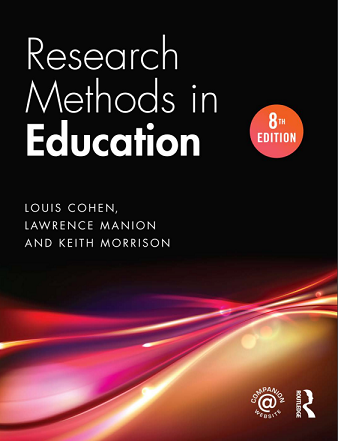
e-BOOK
Research Methods in Education
This part introduces readers to different research traditions, with the advice that ‘fi tness for purpose’ must be
the guiding principle: different research paradigms for different research purposes. A major message in this
part is that the nature and foundations of educational research have witnessed a proliferation of paradigms
over time. From the earlier days of either quantitative or qualitative research have arisen the several
approaches introduced here. This part commences by introducing positivist and scientifi c contexts of research and some strengths and weaknesses of these for educational research, followed by post- positivist views of research. As an alternative paradigm, the cluster of approaches that can loosely be termed interpretive, naturalistic, phenomenological, interactionist and ethnographic are brought together, and their strengths and weaknesses for educational research are examined. Postmodernist and poststructuralist approaches are also introduced, and these lead into an introduction to complexity theory in educational research. The paradigm of mixed methods research is introduced, and its foundations, strengths,
weaknesses, contribution to and practices in educational research are discussed.
Ketersediaan
| 159 | 370.72 | Website | Tersedia |
Informasi Detail
- Judul Seri
-
-
- No. Panggil
-
370.72
- Penerbit
- New York : Routledge., 2018
- Deskripsi Fisik
-
945 halaman
- Bahasa
-
Inggris
- ISBN/ISSN
-
978-1-315-45653-9
- Klasifikasi
-
370.72
- Tipe Isi
-
text
- Tipe Media
-
computer
- Tipe Pembawa
-
online resource
- Edisi
-
Eighth Edition
- Subjek
- Info Detail Spesifik
-
-
- Pernyataan Tanggungjawab
-
Louis Cohen
Versi lain/terkait
Tidak tersedia versi lain
Lampiran Berkas
Komentar
Anda harus login sebelum memberikan komentar
 Karya Umum
Karya Umum  Filsafat
Filsafat  Agama
Agama  Ilmu-ilmu Sosial
Ilmu-ilmu Sosial  Bahasa
Bahasa  Ilmu-ilmu Murni
Ilmu-ilmu Murni  Ilmu-ilmu Terapan
Ilmu-ilmu Terapan  Kesenian, Hiburan, dan Olahraga
Kesenian, Hiburan, dan Olahraga  Kesusastraan
Kesusastraan  Geografi dan Sejarah
Geografi dan Sejarah